This is the second and final part of the testimonies translated from my podcast Renascença Goa https://www.youtube.com/watch?v=24yo5MFthrg and published in Revista da Casa de Goa.
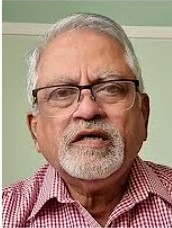 We first have GABRIEL DE FIGUEIREDO, who lives in Melbourne, Australia. He recalls the days that he spent his holidays at Colva beach and in his native village of Loutulim, both in the taluka of Salcete.
We first have GABRIEL DE FIGUEIREDO, who lives in Melbourne, Australia. He recalls the days that he spent his holidays at Colva beach and in his native village of Loutulim, both in the taluka of Salcete.
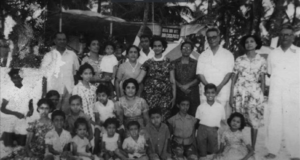 What I understand by mudança: for us kids, mudança was a change of environment – it was going from the city of Panjim, where we lived during school days, to the village of Loutulim and Colvá to spend the holidays and refresh the “soul”. Until about 1964, our Aunt Margarida used to arrange a little house in Colvá for us to spend the month of April, to enjoy the fresh sea air and take a bath, or swim in the sea waves. Our uncles Sebastião (from Margão) and Francisco (from Benaulim), together with their families, used to join us to spend their April holidays there. I don’t know why after 1964 we stopped going to Colvá – maybe the owner of the house had changed.
What I understand by mudança: for us kids, mudança was a change of environment – it was going from the city of Panjim, where we lived during school days, to the village of Loutulim and Colvá to spend the holidays and refresh the “soul”. Until about 1964, our Aunt Margarida used to arrange a little house in Colvá for us to spend the month of April, to enjoy the fresh sea air and take a bath, or swim in the sea waves. Our uncles Sebastião (from Margão) and Francisco (from Benaulim), together with their families, used to join us to spend their April holidays there. I don’t know why after 1964 we stopped going to Colvá – maybe the owner of the house had changed.
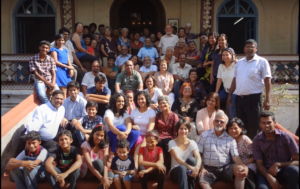 Well, as ours was a musical family, after returning from the beach to the little house, it was time for solfeggio, singing and violin. Apparently, it was here that my father, António, started writing Mandó arrangements after his return to Goa on completion of his training in orchestra conducting at the University of Paris.
Well, as ours was a musical family, after returning from the beach to the little house, it was time for solfeggio, singing and violin. Apparently, it was here that my father, António, started writing Mandó arrangements after his return to Goa on completion of his training in orchestra conducting at the University of Paris.
When we returned to Loutulim to spend the month of May, we had access to home-grown mangoes, jackfruit, cashews, etc. Even in Colvá and also in Loutulim, as there was no electricity supply at the time, Aladdin or Petromax lamps were used at night to give enough light to read. And I read a lot of books those days, more in English than Portuguese, because my maternal grandfather had a book-case full of Reader’s Digest, National Geographic, novels like The Saint (Leslie Charteris), Sherlock Holmes, etc. Around 25 May, a feast of Enthronement of the Sacred Heart of Jesus and Mary used to be celebrated, along with uncles and cousins who also came to spend a few days with us.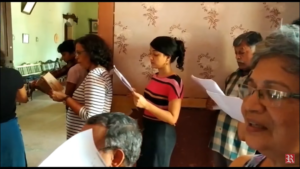
Those were days full of happiness and games. The mudança in October was only to Loutulim, taking advantage of the mid-term vacation that coincided with the Divali festival. We used to hold a novena to Our Lady of Sorrows in the second half of October, with a Rosary sung in Latin and Konkani, on alternate days, the ‘Salve Rainha’ followed by ‘Virgem Mãe de Deus’, both sung in Portuguese.
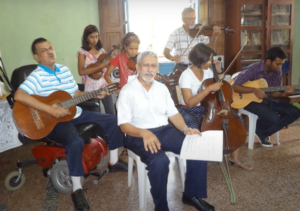 In those days, it was customary for all uncles and cousins to come to spend holidays with us in Loutulim, until the last day of celebration. It was ten days of absolute happiness. Well, after my father passed away in November 1981, this tradition of the month of October came to disappear, unfortunately. My brother Vicente makes an effort to maintain the tradition of Enthronement, along with my sisters Teresa and Celina, inviting cousins and their families (now extending to a few generations) to sing a litany in May, when they go to Loutulim for a mudança when possible.
In those days, it was customary for all uncles and cousins to come to spend holidays with us in Loutulim, until the last day of celebration. It was ten days of absolute happiness. Well, after my father passed away in November 1981, this tradition of the month of October came to disappear, unfortunately. My brother Vicente makes an effort to maintain the tradition of Enthronement, along with my sisters Teresa and Celina, inviting cousins and their families (now extending to a few generations) to sing a litany in May, when they go to Loutulim for a mudança when possible.
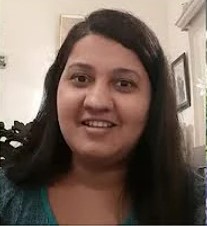 Our next guest is SAADIA FURTADO, from Chinchinim. She remembers spending holidays in Fatrade beach in Varca village.
Our next guest is SAADIA FURTADO, from Chinchinim. She remembers spending holidays in Fatrade beach in Varca village.
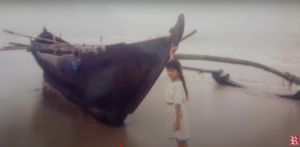 In Goa, the word Mudança is used in a slightly different manner from its original meaning: it means mental rest accompanied by physical relocation. In general, one would go for a mudança during a weekend or when there were public holidays. People from inland areas went to the beach to enjoy the fresh air and to bathe in the sea. It was a healthy practice. One could also go for a mudança by going to a relative’s or friend’s house or live in a rented house in places where there are fountains and springs which have sources of medicinal properties in water, especially in the case of patients with high blood pressure!
In Goa, the word Mudança is used in a slightly different manner from its original meaning: it means mental rest accompanied by physical relocation. In general, one would go for a mudança during a weekend or when there were public holidays. People from inland areas went to the beach to enjoy the fresh air and to bathe in the sea. It was a healthy practice. One could also go for a mudança by going to a relative’s or friend’s house or live in a rented house in places where there are fountains and springs which have sources of medicinal properties in water, especially in the case of patients with high blood pressure!
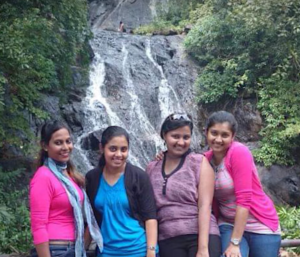 I fondly remember our mudança to Fatrade Beach at Varca, during the months of April and May. There I spent a few days in the company of my parents and relatives. It was a mudança that helped us rejuvenate.
I fondly remember our mudança to Fatrade Beach at Varca, during the months of April and May. There I spent a few days in the company of my parents and relatives. It was a mudança that helped us rejuvenate.
Nowadays, we talk about, that is, when someone goes from one state or country to another for about a week or a fortnight. This meaning is considered different from the term mudança in Goa.
Finally, FAUSTO COLLAÇO, who lives in Margão, goes down memory lane to the holidays spent at his ancestral villages of Raia and Benaulim.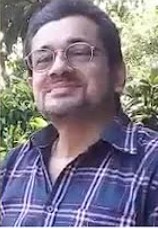
The covid-19 pandemic and its mutant waves heckle us. When talking about holidays, the only holidays we could think of at the moment is to stay at home and spend the holidays there. However, this compulsory retreat takes us back nostalgically to the holidays we used to spend during our childhood, in Goa – the Goa that was for us and the tourist, a Paradise!
When children, we enjoyed semestral holidays. They lasted for over a month each time and so, offered the right opportunity for some holidays during which we stayed over at our grandparents’ place in the village! On my mother’s side it was the beautiful village of Benaulim and on my father’s side it was Raia.
Coming to Benaulim was for us, setting foot on a Fairyland of boundless freedom and fun! My grandparents’ place was a confluence of all people – cousins, uncles and aunts, granduncles and aunts, domestic help and, beyond the walls of the house, family friends and the entire village of Benaulim – from the smallest to the greatest! The chapel in the neighbourhood, tolled its bells morning and evening, proclaiming as though, the dawn and dusk! The children whiled away their time at play and also planning out small skits and recitals which accompanied the dinner of the older people at home. They in turn, were an ocean of love and affection! My grandmother used to bring to the table savoury traditional dishes, pickles and desserts. There was always abundant seasonal fruit like mango and jackfruit.
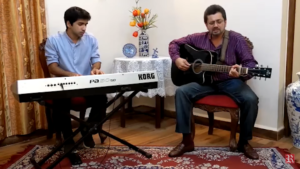 The evenings were often spent in walks by the beach where one would always meet up with friends. We went on occasional picnics in family or in groups. The picnics were naturally regaled with singing and guitars strummed by my uncle Joaquim or other friends. At sunset, the little feet happily plodded back home where, in those bygone days, one was welcomed to the shimmer of kerosene lamps!
The evenings were often spent in walks by the beach where one would always meet up with friends. We went on occasional picnics in family or in groups. The picnics were naturally regaled with singing and guitars strummed by my uncle Joaquim or other friends. At sunset, the little feet happily plodded back home where, in those bygone days, one was welcomed to the shimmer of kerosene lamps!
The ensuing holidays were spent in Raia – my father’s ancestral village. It was a particularly quiet and peaceful village. Our house stood in the remote interior, in a ward called ‘Santemoll’. It was calm and far from the bustle of the city. Once there, one only heard sounds of nature: birds chirping, distant joyful shrieks of children playing, the bellow and the moo. A river flowed luxuriously a little distance away. Other familiar sounds were the honking of the door-to-door bread or fish vendors and the tinkling of the postman on his cycle. He always had a smile, was cheerful and courteously greeted us while even waggling a tad of Portuguese!
Here too, we enjoyed seasonal fruit and, towards the end of May, heralded by lightning and intimidating thunder, came the showers – initially a light drizzle which soon swelled into a heavy downpour! The gutters gurgled noisily and the fields flooded up with rainwater. The weather cooled, grasses and weeds sprouted here and there. There was a burst of green everywhere! The ploughman plunged into work toiling the fields with a pair of oxen and a wooden plough, swinging into action his strong and able arm, with a dextrousness defined by many years of experience! He transformed the field into a veil of greenery undulating in the breeze – an enchanting sight for the locals and tourists alike!
Such was the idyll of village life in Goa and of our holidays in the villages! Today, consequent to changing times, they’re quite different and are on their way to even greater transformation. One hopes, however, that this idyll which was the life and the land of Goa, will never be lost altogether.
——
Acknowledgement: Many thanks to the three guests for their respective translations published in Revista da Casa de Goa, Series II, No. 17, July-August 2022. The third text was further edited by the respective author for this blogpost.